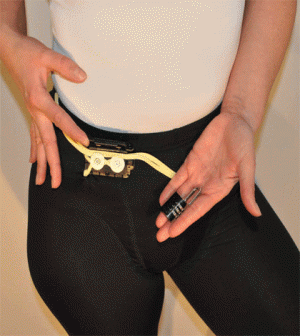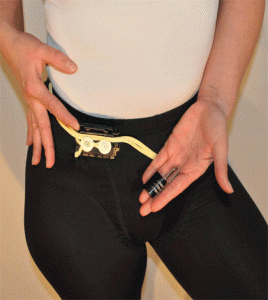- Finding Unshakable Power in a World That Wants to Pull Us ApartPosted 6 months ago
- What could a Donald Trump presidency mean for abortion rights?Posted 6 months ago
- Financial Empowerment: The Game-Changer for Women in Relationships and BeyondPosted 7 months ago
- Mental Health and Wellbeing Tips During and After PregnancyPosted 7 months ago
- Fall Renewal: Step outside your Comfort Zone & Experience Vibrant ChangePosted 7 months ago
- Women Entrepreneurs Need Support SystemsPosted 7 months ago
In wake of #MeToo, anti-rape shorts aim to ease assault fears

By Lin Taylor | Thomson Reuters Foundation
“We can’t have 100 percent protection, but we need a product where we can feel a little bit more safe so no-one can rape us”
LONDON, Feb 23 – It was noon when marathon runner Sandra Seilz was assaulted by three men as she finished her training at a park in Germany.
Pinned down, she managed to escape when a passerby came to her aid as the drunk men tried to pull down her running shorts.
The assault prompted Seilz to create a line of ‘anti-rape’ shorts that use cut and tear-resistant fabric and cords. The clothing is impossible for attackers to pull down, she said.
“We can’t have 100 percent protection, but we need a product where we can feel a little bit more safe so no-one can rape us,” the inventor of the Safe Shorts told the Thomson Reuters Foundation from the city of Bottrop in northwest Germany.
The shorts went on sale in 2017 – a pivotal year for women’s rights after allegations of sexual misconduct against Hollywood mogul Harvey Weinstein sparked the #MeToo campaign, with women taking to social media to share their experiences of abuse.
One in three women worldwide have experienced physical or sexual violence, mostly by someone they know, UN Women says.
 A model wears ‘Safe Shorts’, a line of anti-rape running tights and underwear that are fitted with tear and cut-resistant cords, as well as a 140-decibel alarm that can be triggered to attract attention or to scare an attacker away. Safe Shorts-Sandra Seilz/Handout via THOMSON REUTERS FOUNDATION
A model wears ‘Safe Shorts’, a line of anti-rape running tights and underwear that are fitted with tear and cut-resistant cords, as well as a 140-decibel alarm that can be triggered to attract attention or to scare an attacker away. Safe Shorts-Sandra Seilz/Handout via THOMSON REUTERS FOUNDATION
Seilz said her tights minimise the risk of assault in a country where she believes fears are heightened since a series of sex attacks on women in Cologne on New Year’s Eve in 2015.
Costing 149 euros ($183) for running tights or 89 euros ($109) for underwear, Safe Shorts are also fitted with a deafening 140-decibel alarm, according to Seilz.
“I wish it was not necessary that we would need a product like Safe Shorts. But if there’s a possibility to give this sort of protection, why not?” said Seilz, who has customers in more than 35 countries including Japan, Canada, Australia and Libya.
However rape crisis centres say such devices unfairly put the responsibility on women and give a false sense of security, since most women are raped by someone they know, not strangers. “I’m sure it’s a well-meaning initiative, but I’m always wary about these sorts of products as it is making money out of women’s fears,” Katie Russell, a spokeswoman for Rape Crisis England and Wales, told the Thomson Reuters Foundation.
Other products on the market that attempt to curb sex attacks include colour-changing coasters or straws that women can use to determine if their alcoholic drinks have been spiked.
($1 = 0.8123 euros)
(Reporting by Lin Taylor @linnytayls, Editing by Kieran Guilbert; Please credit the Thomson Reuters Foundation, the charitable arm of Thomson Reuters that covers humanitarian issues, conflicts, land and property rights, modern slavery and human trafficking, gender equality, climate change and resilience. Visit http://news.trust.org to see more stories)
Our Standards: The Thomson Reuters Trust Principles.






